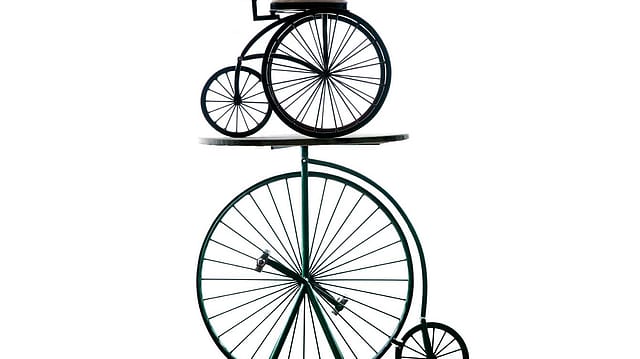Statement of soul
ADVERTISEMENT

STEEL CUPBOARDS AND DIVANS with bolsters are no longer the done thing for urban Indians dressing their homes. At shops such as The Wishing Chair, a three-month-old boutique in New Delhi’s Shahpur Jat, customers buy items to create a home that reflects their taste. “We get a wide variety of customers,” says owner and serial entrepreneur Vivita Relan, who also owns a restaurant in the neighbourhood. “They are people who use Facebook a lot, have money to spare, and are looking for interesting items.”
Her customers come for stools made from vintage tricycles, massive, painted trunks for clothes, shelves and racks, and even raised sitting platforms made of thick old books. Almost all of them, says Relan, discovered her store via Facebook.
“We realised that customers want something that they feel good about, not just because it is pretty but because it makes a larger statement. Design must make you feel good about who you are too,” says Relan, who travelled across the country from Rajasthan to Tamil Nadu to fix The Wishing Chair’s supply chain, and collected furnishings made from junk motherboards, industrial wire, discarded machine tools, and cycle parts.
Such stores give customers more than just the furnishings, says human resource management consultant and design aficionado Shweta Singh. “When we are doing up a home or a room now, we want something that speaks of who we are—and traditional furnishings, no matter how expensive, don’t have that individualised touch. Design has to reflect each person.”
January 2026
Netflix, which has been in India for a decade, has successfully struck a balance between high-class premium content and pricing that attracts a range of customers. Find out how the U.S. streaming giant evolved in India, plus an exclusive interview with CEO Ted Sarandos. Also read about the Best Investments for 2026, and how rising growth and easing inflation will come in handy for finance minister Nirmala Sitharaman as she prepares Budget 2026.
This is what inspired Kolkata’s Ipsita Johri to create AIZA Designs, an online store that prides itself on every piece of furniture being one of a kind. Her company is a hub for customers not looking for the mere traditional, but antiquity with a twist. For instance, the Neel Table is in the colonial style of polished mahogany and soft curves but with a top painted in matte blue, like Raj-era china. Or a bookshelf shaped like the Howrah Bridge.
Parna Sengupta, a software trainer, says she likes Johri’s designs because “they are not the usual designer furniture”. Sengupta bought the pinewood Tram Bar, painted blue, which resembles the tramway cars that ply Kolkata’s roads, and the British Stiff Car chair, a modern, mahogany take on a piece that was staple in Raj-era libraries. She says: “The piece talks about heritage in a very different way.”
In Mumbai, Rajkumar Jain started his Anemos store in Raghuvanshi Mills selling old fans from different parts of the world two years ago, but has now included furniture ranging from teak writing desks and Victorian polished beds to Kerala boats used as sitting arrangements or shelves. Anemos’ pitch is the use of old furniture as a quirky, design input to create a retro setting.
According to Gujarat-based marketing consultants IKON, the Indian home furnishings market is worth Rs 70,000 crore and is growing at 20% each year. It’s no surprise, then, that Designdeal.com, a home-design site that launched in August, had sales of Rs 20 lakh in its first three weeks with “near-zero advertising”. One of its biggest hits is the Aviator range of furniture: chairs, drawers, and chests with a gleaming, metal finish and rivets. Whether it is AIZA or Designdeal.com, most such ventures play the role of a curator bringing small designers and brands under one hub without issues of inventory management. This is quite different from traditional furniture shops, which often make the goods they sell.
“Our biggest feedback has been people telling us that they are looking for something different—that one unique design input,” says serial entrepreneur Gaurav Karan, who set up the Designdeal.com along with art and furniture businessman Amit Vadhera and online art sale pioneer Dinesh Vazirani. “We were discussing homes with our wives and hit upon this. We have customers from Shillong to Surat and the feedback has been very good.”
Roomstory.com founder Prerak Sethi says feedback from customers of his mother’s furniture export business seeded the idea: “People in India would constantly tell my mother that they couldn’t find the right range of furnishings.” Sethi, an MBA from the Kellogg School of Management, started the site in May with Nipun Virmani, who has an MBA from MIT Sloan, with an initial investment of $40,000 (Rs 21.41 lakh).
Roomstory tries to offer a sort of bed-to-bathtub service, selling everything from French hand-knotted carpets to cushion covers with Japanese shibori work to French coffee press machines.
“At the moment, customers are looking for a consolidated experience—can I buy my basic white curtains and also funky decor at the same place? We are one of the few places where the answer is yes!”
